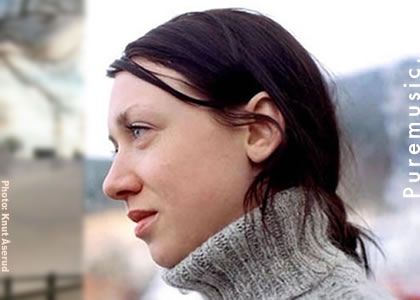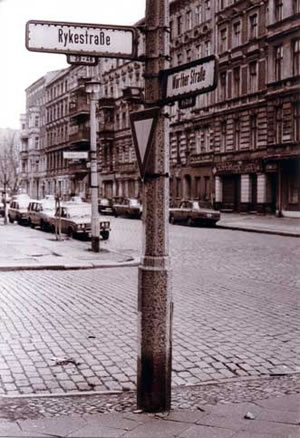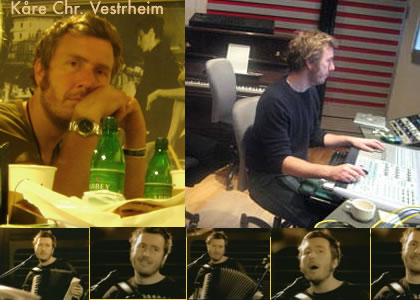
A Conversation with Hanne Hukkelberg
Puremusic: Hi Hanne. My name is Frank Goodman. I'm speaking to you from Nashville, Tennessee.
Hanne Hukkelberg: Yes, I know, Frank. How are you?
PM: Great. We love both of your CDs here at Puremusic.com, Little Things, and the second one, Rykestrasse 68. We think they're really great.
HH: Oh, thanks.
PM: So Rykestrasse 68--that's obviously a street name in Berlin, right?
HH: Yeah, that's right. Actually, I moved to Berlin for half a year to make a recording. And I just wanted to give the CD a name of one of the streets in Berlin because it was a really nice time there, and it gave a lot of inspiration for the music. Actually I also recorded a lot of sounds, atmosphere sounds and town sounds in Berlin, too, as you can hear in the track that's called "Berlin"--you'll hear the background sounds from the street Rykestrasse 68. It was, yeah, very inspiring to be there and make the album.

PM: I lived in Germany for a while making music with my brother. We were living in Heidelberg. He still lives there. But we never did get to Berlin. He says it's one of the coolest greatest cities on the planet at this time. How did you like Berlin?
HH: Well, I really loved it, because--and it's very different being in Heidelberg, because I also have been there--I toured in Europe this spring, so I've been all around. Heidelberg is also very nice, but Berlin is really something special. It's like a free state. Everyone is really allowed to be just what they want to be. And there are so many different kinds of people there. It's really special. Norway is a very little country. And when I'm in Oslo, the capital, it's like everyone knows everybody, and that's really nice in one way. But it will also make you very aware of yourself, because how you are, everyone knows this, notices how you act and how you are. But being in Berlin for me was so nice in the opposite way.
PM: It was liberating.
HH: Yeah, exactly. So I just felt very free and could be just exactly what I wanted to be, and could focus on just the music. So it was a very nice experience for me.
PM: It must be very important for a person like you, because you seem very very free in your composing and in your music.
HH: Yeah, that's right. And also I studied at the Norwegian Academy of Music in Oslo. And I have played in many genres of music. From jazz I've taken the improvisation. And it's a really important thing for me to still be able to improvise, even if I'm not doing straight jazz music now. I wouldn't call myself a jazz singer or a jazz musician. I'm more alternative music. But it's still important for me to improvise. And that includes being very free-minded and also allows the musicians being free, and also in the composing periods, to be really open for how to compose, to find new ways of composing. Yeah, you're right, it's important for me.
PM: When you were studying music at conservatory, were you studying an instrument or studying voice?
HH: I was studying voice. And I also had a lot of lessons--I don't know what to call it, but I had these subjects besides and other studying, and that was composing. So I also studied composing.
PM: And probably studied theory or harmony, like that.
HH: Yeah.
PM: So I've come to enjoy most of all the soft singers. After growing up singing all kinds of music in various ways, do you enjoy being a soft singer now?
HH: Well, I have not always been a soft singer.
PM: Right. Now you are, but you grew up singing all kinds of things, right?
HH: Yes. I come from a very classical background--my parents are classical musicians, and I grew up singing classical. But I also very early started in a pop band and I sang in a rock band, and I even sang in a couple of metal bands. And at the same time I was singing in metal bands I was also singing in a jazz band. And I started in a free jazz band. I've sung in many different genres. I was definitely not always singing softly. Before I started this solo project I was singing a lot in a rock band that I wrote songs for, and I was very active in this rock band. And I was singing the very opposite of what I'm doing now. But I like being this soft singer now. Now I see how I can use my voice and use the differences in my voice live and in the record. So I often sing softer in a record because then I have got more control, or I can express more what I--it's easier to get control over what I want to express in a studio. But live I can also--I have a broader spectrum of what I can use for my voice. So I often sing more strong and use a bigger voice when I do a live concert.
PM: Right. And the other thing about singing softly live or on records is it allows many other soft or subtle sounds that you want to use to have their own voice.
HH: Yeah, that's right. I would say I'm very interested in sounds. And I also experiment very much with sounds in my own studio. I have a home studio and I record sounds, and I put together things, and I make music myself. Also I'm very interested in putting things together, like you say, it's very--how you balance things, it's not always the vocal that should come in the front of the sound picture.
PM: Right, absolutely.
HH: So it's important for me to allow other instruments to take place in a bigger place than the voice sometimes.
PM: Yeah, I think in America we tend to mix the vocals too loud all the time.
HH: Yes, I know what you mean.
PM: In fact, since we're talking about sounds, and you're such a collector and user of found sounds, let's talk about your now long-time collaborator and producer, Kare Vestrheim. How do I say it? Tell us about him.
HH: Well, he is a great producer, first of all. We have collaborated for a long time. And we started making different things in his studio. I came to his place once a week, and we just made music. We had this regular thing like once a week, every week, like every Thursday or something. [laughs] And then, after two years, Little Things was finished. And we both were just very excited because we didn't really know how it was going to end up. But it became really good.
PM: Wow.

HH: And he formed the record company, Propeller Recordings, to release this CD. So he's also the record company, and he's producing the CDs. And he also started playing in my band, on accordion and the piano.
PM: Yes, I've seen him playing on video on youtube playing with your band.
HH: Yeah, yeah. That may be. And he's got very many roles in my career. So he's a really important collaborator. He's also a very good musician to play together with, for inspiration and good ideas and sounds, and how to make the music good, and what we talked about, how to put things together and maybe not the vocal totally in front all the time, but give more space. He's a really good advisor. So yeah, he's a really important guy for my music. continue
print
(pdf) listen to clips
puremusic home